高一英语外研M3P2 Reading and Vocabulary
高中英语外研版必修3素材Period2ReadingandVocabulary(4)

Period 2 Reading and Vocabulary课题教课目标要点难点学情分析教具课件教法Period 2 Reading and Vocabulary课型New1.To enable Ss to master some words and expressions.2. To improve Ss’reading skills.3.To help Ss know something about three Chinese philosophers and their ideas.How to do some explanation about the text.Enable the Ss to know about three Chinese philosophers and their ideas.The Ss can finish the task.1. A recorder2. A projector3. A puter1.Fast reading and careful reading to help the students understand the passage exactly.教课程序Step 2.Individual, pair or group work to make every student work in class.教课内容Step 1. Revision师生时活动间分配1 1. Check the answers to Activities 4, 5 and 6 in Vocabulary on page 92.2. Ask Ss to fill in the following blanks.(1)Confucius is one of the great p in ancient China.(2)They believed that all human beings are created e.See(3)China has made great c to science.the(4)“H is an important quality.”the teacher said.pict(5)A r is someone who controls a country.ures(6)As we all know, Edison is a great i.&12 ’(7)More and more people have realized the i of English,talkso they begin to attend all kinds of language schools.(8)Some of Mozi’s(学说 ) were different from those ofConfuciusStep 2Suggested Answers:(1) philosophers (2) equal (3) contributions (4) Honesty(5) ruler(6) inventor (7) importance (8) teachingsStep 2. Leading-in Rea 1. Ask Ss to look at the pictures on page 43 and talk about them by d& following the questions:do(1) Say three things you know about Confucius.exx(2) Say what you know about Mencius and Mozi.Step 3Step 430 ’Confucius Mencius MoziStep 3. Reading1. Fast readingAsk Ss to read the text quickly and answer the question:Who wrote a book himself, Confucius, Mencius, or Mozi?Suggested Answers:Mencius2.Intensive reading(1)Ask Ss to read the text carefully and choose the correctanswers to Activity 3 on page 42.lear(2) Ask Ss to fill in the following form.n& philosop sth about their life their influence prachers ideas tice551BC---479BC,Confuciu a time when⋯sMenciusMoziSuggested Answers:(3) Ask Ss to retell the text according to the information in the form.For your reference (information about Confucius):Confucius was born in 551BC and died in 479BC. It was a timewhen states were often at war and also a time when there were manygreat philosophers. He stressed the importance of kindness, duty andorder in society. His influence, which lasted for more that 2000 years,was the greatest of the three.Step 4. Language PointsAsk Ss to discuss the important and difficult language points.1. Ancient China was a place where states were at war with each other.中国古代各侯国常交。
外研社必修五阅读-M3P2 Reading and Vocabulary
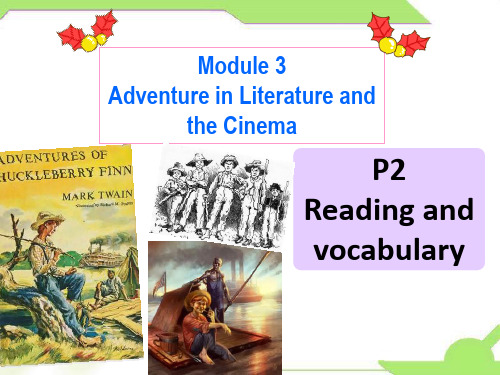
Read Para.2 - Para.5 and answer the questions. 1. What did Huck want to do? He wanted to paddle over and climb onto the steamboat. 2. What did they hear after they got on the steamboat? They heard someone shout, “Oh please boys, don’t kill me! I won’t tell anybody”.
Huck's father, an alcoholic drifter
the widow’s sister, a tough old woman
Miss Watson’s big, mild-mannered slave. Then he became Huck’s fellow travelers on the Mississippi River.
Let’s read the passage about Adventure of Huckleberry Finn and say what type of book it describes.
The Adventures of Huckleberry Finn, by Mark Twain, is perhaps the most famous American novel ever written. Huckleberry Finn (or just Huck) is a teenage boy who has run away from home. His companion is Jim, a black slave who has also run away. The two of them are sailing down the Mississippi River on a raft when they see something in the water ahead of them…
外研版高中英语必修三1-2Readingandvocabulary

2.to be in a certain place __a_n_c_i_e_n__t.
Match the words with the
2
definitions. Ancient architect gallery landmark locate sculpture writer 3. something that is easy to recognise, such as a building _la_n_d_m__a_r_k__.
8. There were a lot of good √
writers in ancient Athens.
Match the words with the
2
definitions. Ancient architect gallery landmark locate sculpture writer 1.someone who designs buildings
5
Discussio
n
1.What did you know about these cities
2.before you read the text?
3.2. What new information did you learn?
4.3. Which of them would you most like to visit if these sentences
are T or F
TF
4. The Church of the Sagrada
√
Familia was built in 1926.
5. The artistic movement called √
外研社高一英语必修二M3 Module 3 Reading and Vocabulary (Ⅱ)

3. Having worked there for 30 years, Haydn moved to
London, where he was very successful. 在那儿工作了30
年后,海顿移居伦敦,在那里他获得了很大的成功。 动词的-ing形式的完成形式having done 表示发生在主 句动作之前,和句子主语是主动关系,并作时间状语。 Having worked in the factory for half a year, he learned a lot from the workers. 在这家工厂工作了半年之后,他从工人那里学到了很 多。
1.________ audience n.听众 n.古典音乐 n.音乐家 n.宫廷
classical 2._______ musician 3.________
4._____ court
5._______ director genius 6.______
talent 7. ______ compose 8. ________
I’d like to change this dress for one in a larger size.
我想把这件衣服换成大号的。
Shall I change seats with you?
我和你换座位好吗?
Hurry up!No time to get changed!
快点!没时间换服装了!
get changed 换装 (2) change用作名词,表示“变化”时,常用作可数名 词;作“零钱;找零”讲时,用作不可数名词。 The little boy reached in his pocket and pulled out some change. 小男孩把手伸进口袋,掏出了一些零钱。
2019年年秋外研版高中英语必修一课件:M3 Reading and Vocabulary共35张PPT语文
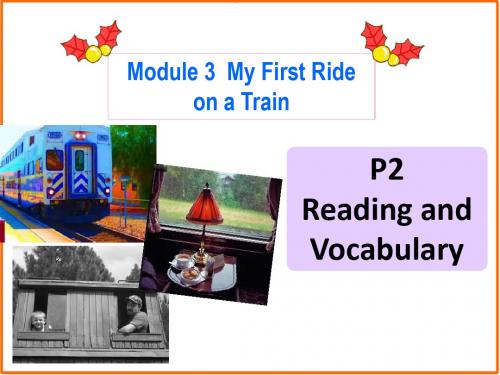
in something __e_x_p_e_r_t___
15. a small flat plastic case containing tape for playing
or recording music or sound _c_a_s_s_e_tt_e__
sale _p_r_o_d_u_c_t __
11. the amount of space between two places or things
_d_is_t_a_n_c_e__
12. left and no longer wanted, used or needed
_a_b_a_n_d_o__n_e_d__
1. Did Alice travel on the train a long time ago?
2. Was her destination on the coast of Australia?
3. Was the scenery the same during the whole journey?
3. Was the scenery the same during the whole journey? No, at first there were fields, then it was desert.
4. Did she study while she was on the train? Yes, she studied Chinese.
Paragraph 1 Paragraph 2 Paragraph 3 Paragraph 4 Paragraph 5 Paragraph 6
高中英语外研版必修3素材Period2ReadingandVocabulary(3)
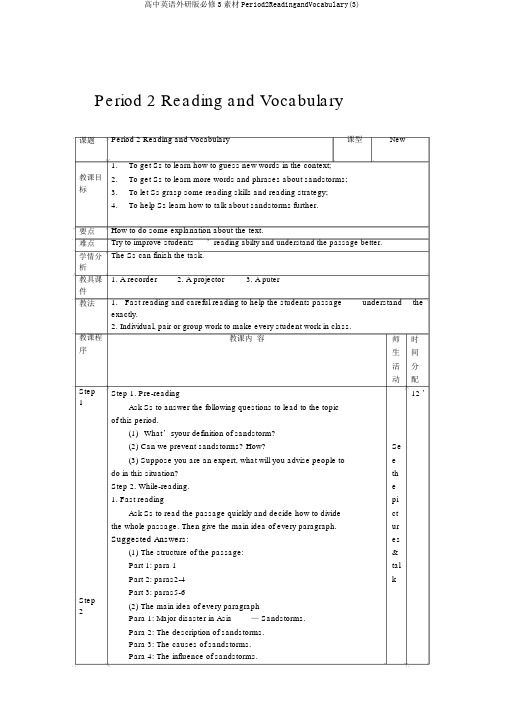
Period 2 Reading and Vocabulary课题教课目标要点难点学情分析Period 2 Reading and Vocabulary课型New1.To get Ss to learn how to guess new words in the context;2.To get Ss to learn more words and phrases about sandstorms;3.To let Ss grasp some reading skills and reading strategy;4.To help Ss learn how to talk about sandstorms further.How to do some explanation about the text.Try to improve students’reading abilty and understand the passage better.The Ss can finish the task.教具课件教法教课程序1. A recorder 2. A projector 3. A puter1.Fast reading and careful reading to help the students passageexactly.2.Individual, pair or group work to make every student work in class.教课内容understand the师时生间活分动配Step 1Step 2Step 1. Pre-reading12 ’Ask Ss to answer the following questions to lead to the topicof this period.(1)What’s your definition of sandstorm?(2)Can we prevent sandstorms? How?Se(3)Suppose you are an expert, what will you advise people to edo in this situation?thStep 2. While-reading.e1. Fast reading piAsk Ss to read the passage quickly and decide how to divide ctthe whole passage. Then give the main idea of every paragraph.ur Suggested Answers:es(1)The structure of the passage:&Part 1: para 1talPart 2: paras2-4kPart 3: paras5-6(2)The main idea of every paragraphPara 1: Major disaster in Asia— Sandstorms.Para 2: The description of sandstorms.Para 3: The causes of sandstorms.Para 4: The influence of sandstorms.Para 5: The forecast and suggestions of sandstorms.RePara 6: The measures taken by the government.ad30 ’2. Intensive reading&(1) Ask Ss to read the passage carefully in pairs and check the domeanings of the new words or difficulty words with each other. If exthey have difficulty, they may refer to the dictionary.x(2) Check whether Ss understand some words or phrasesin the passage. Ask them to find words to match the definitions.① to ride a bicycle______②someone who knows a lot about a particular subject________③things that happen one after another, and have a result________④someone who first lives in a particular town or country________⑤very small bits of dirt or earth, on the ground or in the air______⑥to continue to live after a difficult or dangerous situationor event _____⑦ to say what will probably happen______⑧everything that is happeningat a particular time_______⑨ sand hills_______⑩ to cause a change________11_______○ something that is worn over one’s face12strong_______○ the noun form ofSuggested Answers:le① cycle② expert③ process④ citizen ⑤ dust⑥arsurvive n⑦ forecast⑧ situations11&⑨ sand dunes ⑩ affect○ mask12pr○ strength能够自己多出一些题目,也能够就书上的练习把如何指引学生的过ac 程给出。
外研版必修三Module2readingandvocabulary
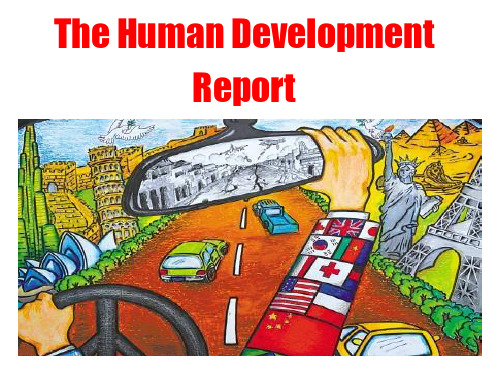
How to face the challenge
Post-reading
①Why did the world leaders agree to work together? A. To reduce money by 201 5 or earlier B. To reduce poverty by 2015 or earlier C. To reduce disease by 2015 or earlier. D. To improve life by 2015 or earlier.②From the text, we can know China_______. A. is in the thirteen position of the list B. increased life expectancy by 13 years in nine years. C. is a developed country. D. has 115 million children who are not being educated.
Fight
drinking
poverty
poor
environment
Reduce1. _______ and 2. _______;Make sure that all children have 3. ________ up to the age of 11;
education
developed countrcide if the statements are T or F. If it is F, give the right answer.
greater efforts
外研版高中英语必修3Module3_Reading_and_Vocabulary_名师教学设计(二)
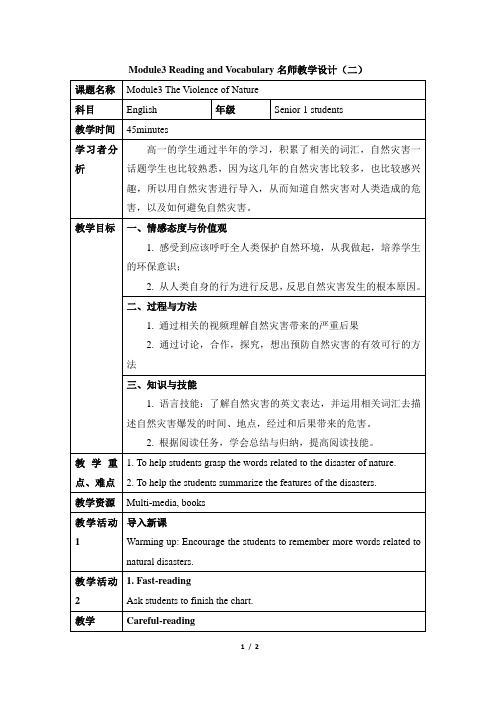
教学重点、难点
1. To help students grasp the words related to the disaster of nature.
2. To help the students summarize the features of the disasters.
教学目标
一、情感态度与价值观
1.感受到应该呼吁全人类保护自然环境,从我做起,培养学生的环保意识;
2.从人类自身的行为进行反思,反思自然灾害发生的根本原因。
二、过程与方法
1.通过相关的视频理解自然灾害带来的严重后果
2.通过讨论,合作,探究,想出预防自然灾害的有效可行的方法
三、知识与技能
1.语言技能:了解自然灾害的英文表达,并运用相关词汇去描述自然灾害爆发的时间、地点,经过和后果带来的危害。
教学
活动4
Group Work
Watch the video and summarize the tips of how to survive in the natural diaster.
教学活动5
Self-assessment
To write as many words or phrases related to the disaster of nature as possible.
教学
活动3
Careful-reading
Read the first two passages and complete the chart.
Watch the video and use the verbs to describe the destruction of tornado.
高一英语 module3 Reading and vocabulary教案 外研版必修2

外研版必修2 模块3 Reading and vocabularyTeaching Aims:Train the students' reading ability.Learn some useful words and expressions.Teaching Important Points.Help the students to understand the passage better.Learn and master some important words and phrases in this period.Teaching Difficult Points:How to help the students improvetheir reading and understand the passage better. Teaching Methods:Fast reading to get the general idea of the text.Careful reading to understand the passage better.Discussion to help the students understand what they've learned better. Teaching procedure.Step 1 Lead --inThe teacher may play a kind of music written by Beethoven.------- What kind of music do you think it?----- Who do you know wrote it ?The teacher may discuss the questions and answer them freely.T: As we know, there are various kinds of music around the world. They all have their own obvious characteristic. And also there were famous posers such as Joseph Haydn, Mozart, and Beethoven. Today we may learn of their life from the text.Step 2 Reading prehension.Fast reading: Read the passage quickly and choose the best title.A.Three Great Austrian posers.B.Three Great poser of the eighteenth Century.C.Three Great Child posers.Key: B.Now let's read the passage again, underline new words in the text and decide whether the following statements are right or not.1.The three posers were all born in Austria.2.Mozart had a beautiful singing voice.3.Mozart died before his fortieth birthday.4.Beethoven once worked at the court of a prince, who began to go deaf when he grew older.5.Beethoven had ever met Haydn, but he didn't think he taught him a lot.6.Both Haydn and Mozart had fathers who were musicians.Key:1.F Beethoven was born in Bonn, Germany.2.F. Haydn had a good singing voice.3.T4.F. Haydn once worked at the court of a prince, but he didn't go deaf.5.T6.F. Haydn was the son of a peasant( The teacher may begin with the T/F questions orally and this is a good time to test their listening abilities as well as their prehension of the text. )Step 3 Read and listen to the passage. Meanwhile, some more questions are waiting for you.1.How did Haydn change the form of symphonies?2.How long did he work in eastern Austria?3.How many pieces of music did Mozart pose?4.How old was he when he played for the Empress of Austria?5.How long were Mozart and Haydn friends?6.Who taught Beethoven how to play the piano?7.Did he stop posing when he became deaf?Keys:1 He changed the symphony into a long piece for a large orchestra.2. 30 years.3.More than 600 pieces of music.4. When he was 6 , he played the harpsichord in a concert for the Empress of Austria.。
高中英语外研版必修3教案Period2ReadingandVocabulary
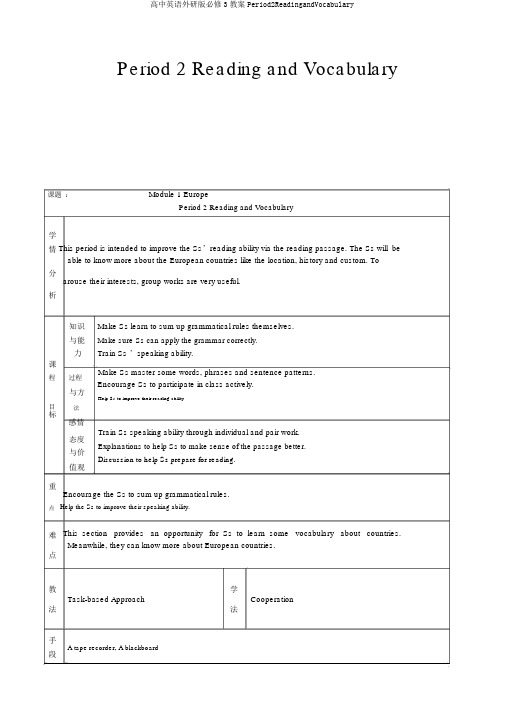
Period 2 Reading and Vocabulary课题:Module 1 EuropePeriod 2 Reading and Vocabulary学情 This period is intended to improve the Ss’reading ability via the reading passage. The Ss will be able to know more about the European countries like the location, history and custom. To分arouse their interests, group works are very useful.析知识Make Ss learn to sum up grammatical rules themselves.与能Make sure Ss can apply the grammar correctly.力Train Ss ’speaking ability.课Make Ss master some words, phrases and sentence patterns.程过程Encourage Ss to participate in class actively.与方Help Ss to improve their reading ability.目法标感情Train Ss speaking ability through individual and pair work.态度Explanations to help Ss to make sense of the passage better.与价Discussion to help Ss prepare for reading.值观重Encourage the Ss to sum up grammatical rules.点 Help the Ss to improve their speaking ability.难 This section provides an opportunity for Ss to learn some vocabulary about countries.Meanwhile, they can know more about European countries.点教学Task-based Approach Cooperation法法手A tape recorder, A blackboard段Step 1. Lead-in , Introduction and Vocabulary教学过程Introduce more about some European countries.Learn the new words and expressions.Step 2. Reading1.Read the passage and match the photos with these descriptions.2.Ask the Ss to do the activity individually, then check with a partner.3.Call back the answers from the whole class, asking for whole sentences.1).Which of the cities are capital cities?2).Which one is situated on the coast?3).Which is famous for its places to eat?4).Which ones are or were important cities for writers and artists?5).Which was the world ’s greatest city a long time ago?4.Read the passage again and decide if these sentences are true(T) or false(F)1).The Eiffel Tower is a tall building in France.()2). There are a lot of restaurants and cafes in Paris.()3).Barcelona is the capital of Spain. ()4).The Church of the Sagrada Familia was built in 1926.()5).The artistic movement called the Renaissance began in Florence.6). The Uffizi Palace is a famous hotel in Florence.()7). A long time ago, Athens was the world’s most powerful city.()8). There were a lot of good writers in ancient Athens.()Step 3 Language Pointslo1.on the coast of, off the coast of,coast means the area where the land meets the oceanon the coast means on the land near the oceanoff the coast means in the ocean near the land2.face( 动词 )My house faces the sea.She turned to face me.He is facing the biggest challenge of his career.If found guilty, he could face up to 20 years in jail.I want to have a face- to -face talk with you.His father hit him in the face.3.acrossShe took a ship across the Atlantic.The boat carried them across the river.The police pushed their way through the crowd.across穿一个平面,而through穿一个立体空4.be situated/located加介表示某物的地点。
高中英语(外研版)必修三: module 3 period 2 reading and vocabulary 含解析

温馨提示:此套题为Word版,请按住Ctrl,滑动鼠标滚轴,调节合适的观看比例,答案解析附后。
关闭Word文档返回原板块。
课堂10分钟达标Ⅰ. 单词拼写1. The old man ________ (经历)two world wars.2. Sun, air and wind ________ (引起)quick chemical changes.3. Mr and Mrs Shaw have bought some modern ________ (家具)for their living room.4. I wondered where they would ________ (埋葬)Lady Thatcher.5. Food shortages often ________ (发生)in times of war.6. The hurricane ________ (袭击)the city at midnight.7. The storm was a very ________ (猛烈的)one.8. Thousands of people died in the natural ________ (灾难).9. At this ________ (纬度)you often get strong winds.10. The ________ (羽毛)of that kind of bird look very beautiful.答案:1. experienced 2. cause 3. furniture 4. bury 5. occur 6. struck 7. violent 8. disaster 9. latitude 10. feathers Ⅱ. 单句语法填空1. The reason ________ he gave for being late was ________ he forgot to set the alarm clock.【解析】which; that。
外研版高中英语必修3Module2_Reading_and_Vocabulary_公开课课件(二)

Countries
Reading and ulary
1.Learn the main meaning of the text. 2.Improve the students’ reading ability. 3.Learn some words and phrases.
countries in three ways D. To urge the countries in the world to work together
to reduce poverty.
2.Which of the following is NOT the goal made by the
report according to the passage? D
D. Urging all the developing countries to fight with poverty and illness.
3.Which of the following statements is NOT true about the conclusion made by the
1. What did world leaders agree to do in 2000? 2. What does the Human Development Index
measure? 1.World leaders agreed to work together to reduce poverty by 2015 or earlier.
Read and answer the questions.
1. What did world leaders agree to do in 2000? 2. What does the Human Development Index measure?
- 1、下载文档前请自行甄别文档内容的完整性,平台不提供额外的编辑、内容补充、找答案等附加服务。
- 2、"仅部分预览"的文档,不可在线预览部分如存在完整性等问题,可反馈申请退款(可完整预览的文档不适用该条件!)。
- 3、如文档侵犯您的权益,请联系客服反馈,我们会尽快为您处理(人工客服工作时间:9:00-18:30)。
Module 3
Reading and Vocabulary
Before the class I want you to be engaged in the material. I Not necessarily thinking about want you to be engaged in whatever it is I want you toevery class. in the be engaged that we are discussing inword that I say. getting down Better attention, better Not necessarily thinking about getting material. I want you to benotes engaged I’d like you to take active understanding of the material down every word that I say. I’d like you to in whateverpassive notes. Write it is that we are rather than rather engaged. take activeare activelythan passive notes. if you notes discussing in can make you feel or Write down whatclass. you feel or down what can make learn something. learn something. Better attention, better understanding of the material if you are actively engaged.
3. You should pass the ball before they trapped (夹击) you. 你应该在他们夹击以前就传球。 (球类运动中)传递 4. The ten days passed quickly. 这十天很快就过去了。 (时间)推移, 流逝 5. The bill finally passed. 法案最终通过了。 He passed in German. 他德语考试及格了。 (考试等)及格; 通过; 被批准
5. not…any more 不再…… not …any more = no more 表示动作不再重复出现,与瞬间动词 连用。 Now she wasn't afraid any more. 现在她再也不害怕了。 not …any longer = no longer 表示动作延续,必须和表示延续动词 连用。 They will not talk with each other any longer.
Match A.the origin of the Paragraph 1 She tells Ghan train and the means of transport Paragraph 2 She describes for traveling a long Paragraph 3 distance in the past
Scanning
Reading Comprehension III True or False. 1. It was the first time that Alice had her ride on a long-distance train. 2. Alice Springs is in the east of Australia. 3. The train is called the Ghan because of horses from Afghanistan. 4. The train was comfortable, but the food cooked by experts was bad. 5. In the 1920s, people used camels to carry food and other supplies. 6. Alice talked to other passengers, read books, listened to music and so on.
pass vi. 1. You cannot pass. Stop where you are. 你不能过去。原处停下。 前进; 通过; 经过 2. The pain passed. 疼痛消失了。 Grandpa passed away last night. 祖父昨晚过世。 终止, 消失; 离开, 死亡 [(+away)]
Scanning
Reading Comprehension IV
Answer the following questions. 1. Did Alice travel on the train a long time ago? No, she traveled on the train recently. 2. Was her destination on the coast of Australia? No, it was Alice Springs in the center of Australia. 3. Was the scenery the same during the whole journey? No, at first there were fields, then it was desert.
pass vt. 1. We passed several stores before we came to the barber's. 我们走过几家商店才到了理发店。 经过, 穿过, 越过 2. Please pass me the salt. 请把盐递给我。 传递; 传达 3. The bill was passed in 1908. 这项议案是一九○八年通过的。 通过(考试、检查等); 使及格; 批准(议案等)
现学现用 Work in pairs, one of you make up sentences with pass in English, the other make up sentences in Chinese.
Then you exchange and translate them.
To get detailed information
vt. 训练 train
Objectives 1. 理解课文中提供的介绍旅游的材
料并获取信息。
2. 能运用过去时间的表达法介绍自 己旅游的情况和各种回忆。
To get general ideas
Skimming
Reading Comprehension I What’s the passage about?
6. allow/permit doing sth. allow/permit sb. to do sth. Look at the following: Which is wrong? 1) They don’t allow smoking in the room. 2) They don’t allow people to smoke in the reading room. 3) Smoking is not allowed in the room.
Paragraph 4 Paragraph 5 She explains Paragraph 6
B. when and where their travel took place C. the scenery all the journey
To solve difficult points
1. ride n. 骑马(或乘车) 旅行, 兜风 give sb. a ride 让某人搭车 He gave me a ride to the plaza. 他让我搭车去市场。 We went for a ride in the car. 我们开车兜风。 vt. 骑(马等); 乘(车等) ride a bicycle/horse/motorbike vi. 骑马, 乘车; 骑马(或乘车)旅行 She rode home on her bicycle. 她骑自行车回家。
4. the 1920s/1920’s 20世纪20年代 在……世纪,……年代(必须加the) in the 2000s/2000’s 在21世纪
in the 1960s/1960’s 在20世纪60年代
in the 1850s/1850’s 在19世纪50年代
在某人十几/二十几/三十几……九十几岁
3. supply un. 供给;供应; 补给 cn. 供给物;供应品;贮备(常用复数) 1) A new supply of shoes is expected shortly. 2) a food/water supply supply v. 提供,供给 supply sb. with sth. = supply sth. to sb. 1) They supplied the homeless children with food and clothing. 2) They supplied food and clothing to the homeless children.
4) They don’t allow to smoke in the room.
Let the word fly 板块是帮助学生学习一 些一词多义、熟词生义的词汇。通过此
环节,学生可以对一些常见词的用法、
意思有一个全面的了解。在翻译过程中
体会词汇使用的丰富多彩。
试着翻译下面的英文,注意单词pass的 用法。 pass n. 1. No pass, no passage. 没有通行证不得通过。 通行证; 护照; 入场证[C] 2. He got a pass in English. 他英语考试得了个及格分数。 及格; 及格分数[C]
